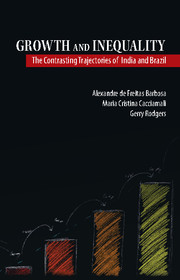Book contents
- Frontmatter
- Contents
- List of Tables
- List of Graphs and Maps
- Preface and Acknowledgements
- List of Abbreviations
- 1 Brazil and India: A Mirror Image of Each Other?
- 2 Approach and Method
- 3 Brazil and India in the Decades before 1980
- 4 India and Brazil from 1980 until 2014
- 5 Key Divides and Cleavages: Ruptures, Continuities, or Adaptation?
- 6 Inequality in Social and Economic Context
- 7 Post-Script
- Bibliography
- Index
1 - Brazil and India: A Mirror Image of Each Other?
Published online by Cambridge University Press: 02 August 2019
- Frontmatter
- Contents
- List of Tables
- List of Graphs and Maps
- Preface and Acknowledgements
- List of Abbreviations
- 1 Brazil and India: A Mirror Image of Each Other?
- 2 Approach and Method
- 3 Brazil and India in the Decades before 1980
- 4 India and Brazil from 1980 until 2014
- 5 Key Divides and Cleavages: Ruptures, Continuities, or Adaptation?
- 6 Inequality in Social and Economic Context
- 7 Post-Script
- Bibliography
- Index
Summary
Concern about inequality is nothing new, but in recent years it has become a central part of the debate on growth and development. There are many reasons. One is that economic inequality has been growing in many parts of the world, raising doubts about the fairness and inclusiveness of prevailing development paths. Another is that globalization has changed the pattern of winners and losers and excluded many from the benefits of global growth. There is also increasing recognition that high levels of inequality may adversely affect not only the nature of growth, but also its pace and sustainability. Political reactions to inequality include a sense that there must be limits to how far wealth and income should be concentrated among a small fraction of the world's population.
The political debate draws on the growing academic literature on inequality, in which an important landmark was Kuznets’ pioneering empirical work in the 1950s (Kuznets, 1955). This was followed by a substantial expansion of research into the nature and sources of economic inequality (Atkinson, 1973, 1983; Sen, 1982). In the last decade or so a number of influential publications (including Atkinson and Piketty, 2010; Stiglitz, 2012; Piketty, 2014; Atkinson, 2015; Milanovic, 2016) have documented the extent of inequality of income and wealth and its consequences. These authors show that inequality is a fundamental dimension of both national and global economies, and one that needs to be more effectively addressed by public policy.
That is the point of departure of the present book, which is built on the view that economic inequality can only be understood, and policies to reduce it can only be effective, when the historical process through which particular patterns of inequality arise both within and between countries is taken into consideration. This calls for an analysis of social and political forces, their development over time, and how they interact with capital accumulation and growth.
The debate on inequality runs parallel to the emergence, in recent decades, of a large number of middle-income countries as influential participants in the global economy. That is the genesis of the BRICS group of Brazil, Russia, India, China, and South Africa. But, beyond the political grouping, the history of these countries can provide insights into how patterns of distribution have been embedded in their growth and development, and into the ways economic, social, and political structures have interacted.
- Type
- Chapter
- Information
- Growth and InequalityThe Contrasting Trajectories of India and Brazil, pp. 1 - 10Publisher: Cambridge University PressPrint publication year: 2017



